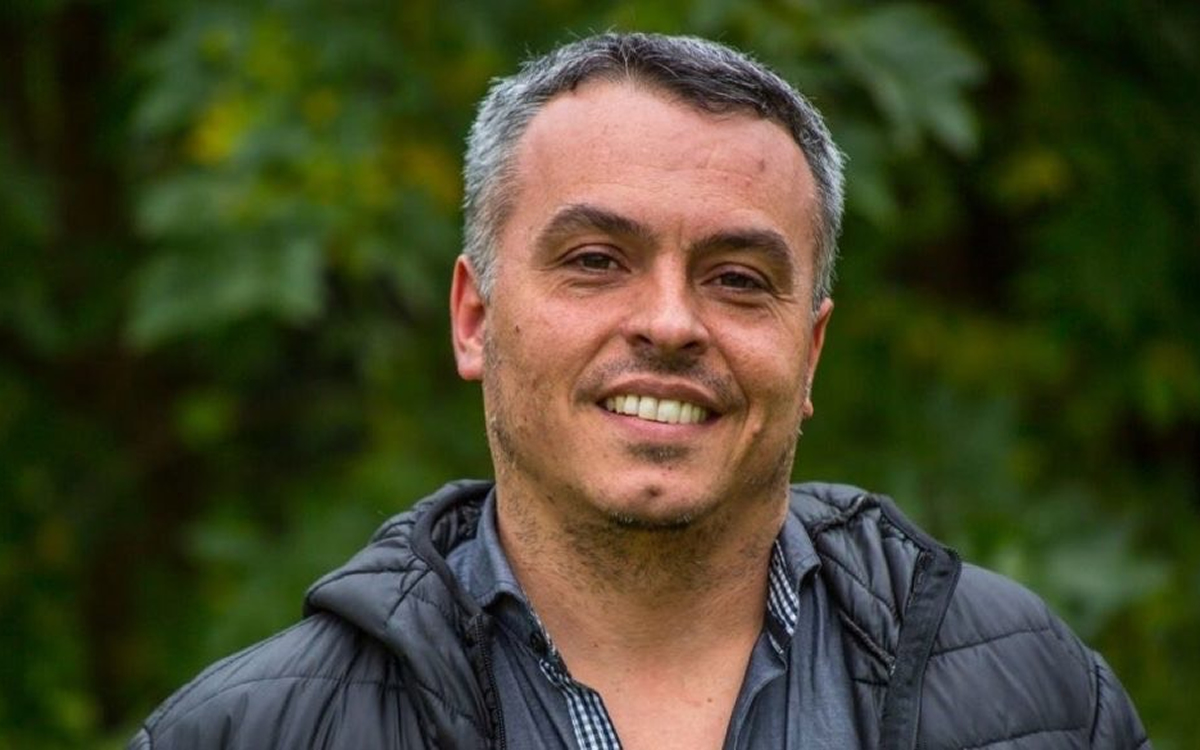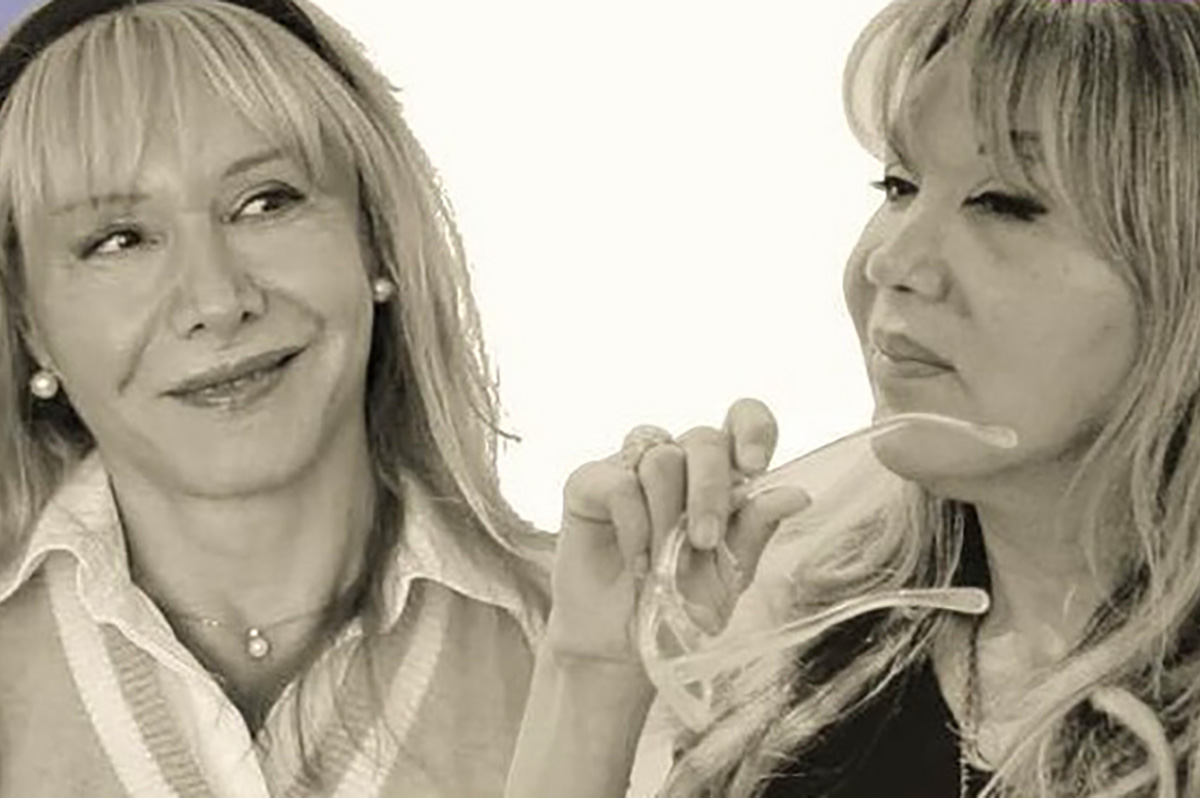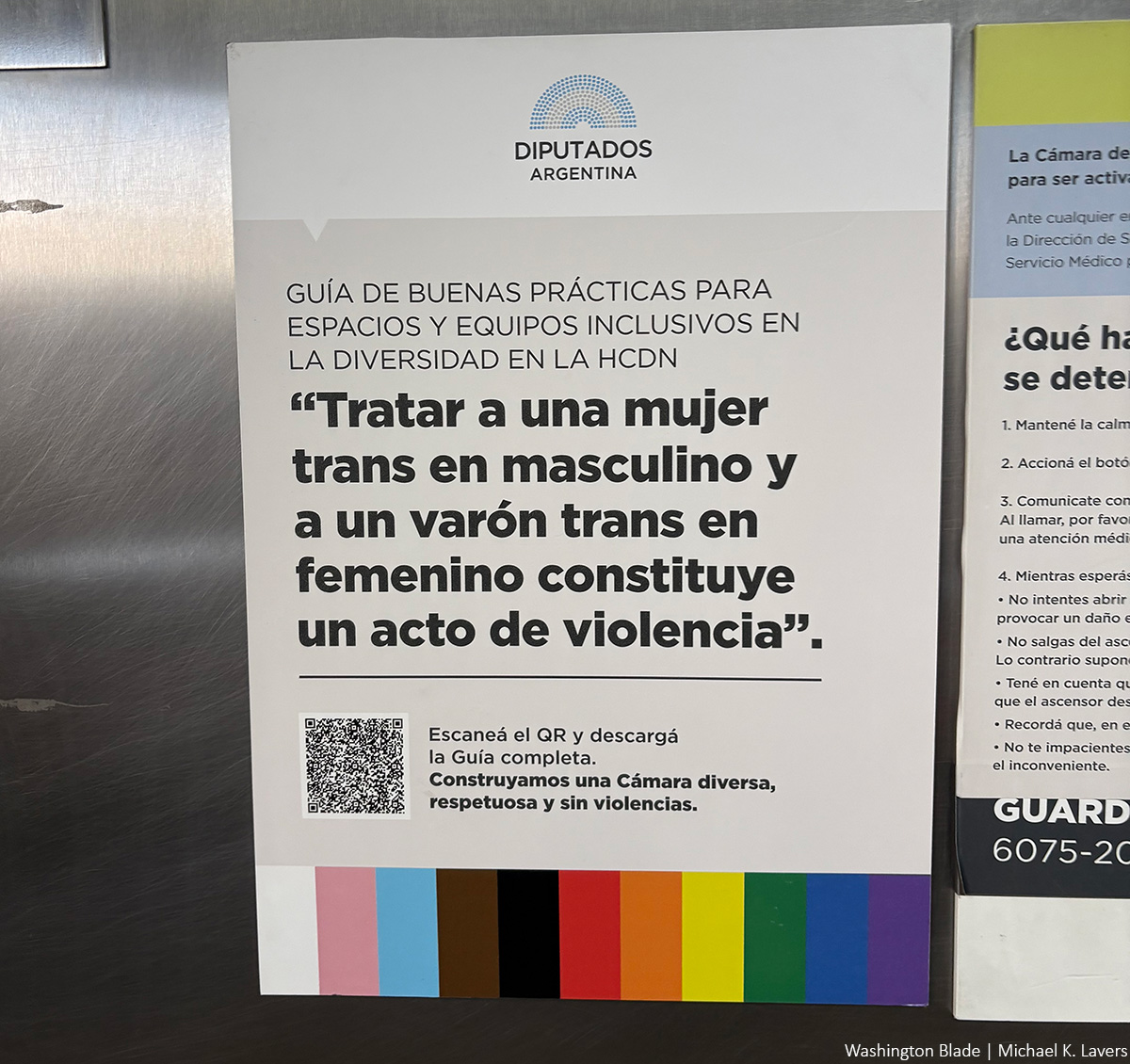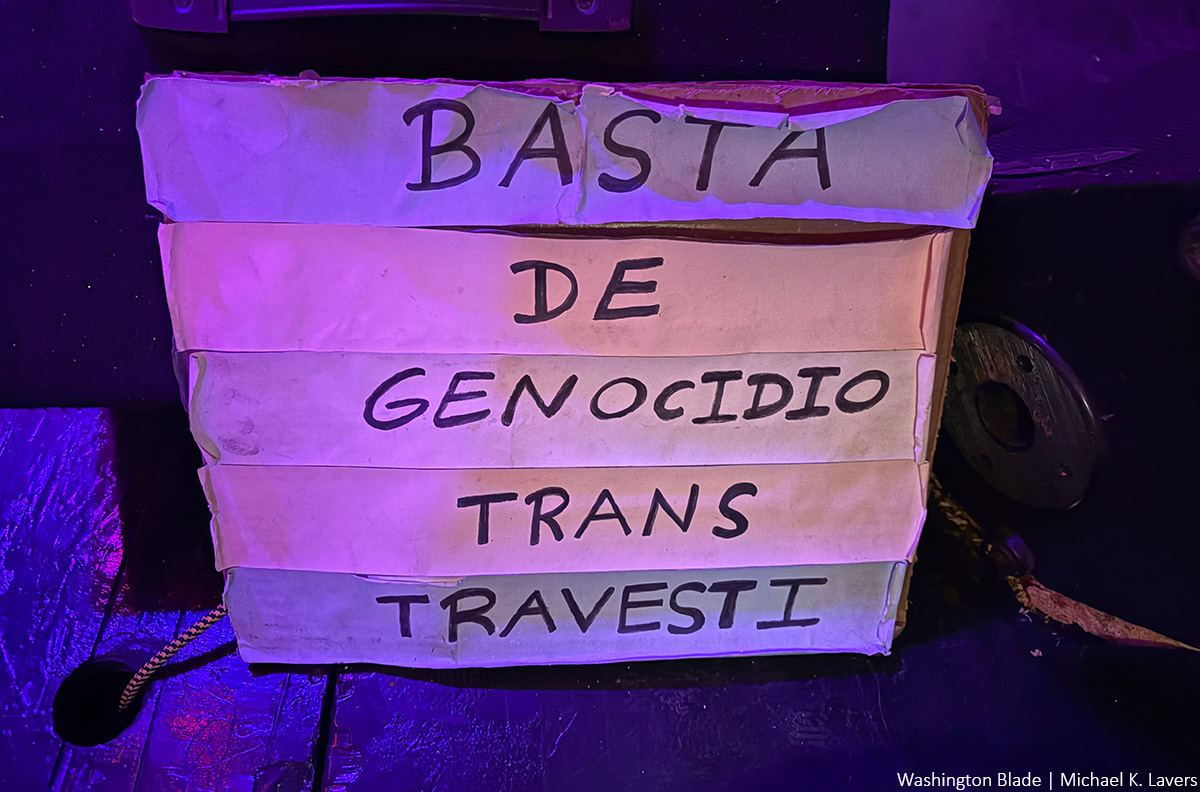Argentina
LGBTQ seniors in Argentina face uncertain future
President Javier Milei’s policies have disproportionately impacted retired pensioners

Editor’s note: International News Editor Michael K. Lavers will be on assignment in Argentina and Uruguay through April 12.
Argentina has undergone significant changes in its economic and social policies since President Javier Milei’s inauguration in December 2023. These changes have had a significant impact on various sectors of society, especially retirees and the LGBTQ community.
Mercedes Caracciolo, a 79-year-old sociologist and lesbian activist, shared her experience with the Washington Blade on how the new measures have affected her quality of life.
“Since Milei’s arrival in government, which began with a brutal devaluation, I am more careful in my spending than I was before,” she said.
Although Caracciolo has additional income from rental properties, she recognizes the situation is much more critical for those who exclusively depend on a pension.
With more than 7 million people receiving pensions, many find themselves “scratching the poverty line” due to the loss of purchasing power. The libertarian government’s economic policies have drastically affected their welfare, leading to a wave of protests across the country.
The reduction of social programs and the lack of LGBTQ-specific public policies have deepened the difficulties that seniors already face. The loss of economic stability particularly affects those who have historically lived on the margins, with fewer job opportunities and limited access to a decent retirement. Many older LGBTQ people, who have spent their lives unable to form traditional families, now find themselves without a support network and with an increasingly less present State.
The advance of conservative discourses has also generated a climate of insecurity and fear.
“There is no more sense of security and stability in old age,” Graciela Balestra, a psychologist who is the president of Puerta Abierta a la Diversidad, the first home for LGBTQ seniors in Argentina, explained. “Many LGBTQ+ retirees fear that there are fewer and fewer rights. They see what is happening in Argentina and globally with the advance of the right wing, and they feel that what they worked so hard to achieve is in jeopardy.”
In addition to economic difficulties, the LGBTQ community has faced additional challenges.
Caracciolo noted many supportive spaces have had their government subsidies reduced or eliminated, weakening community networks essential to the well-being of LGBTQ seniors.
“Community networks are also weakened because many of them require state support for certain types of expenses,” she noted.
Balestra warned about the psychological impact.
“Obviously it impacted mental health. There is much more anxiety, there is fear. People who say ‘I’m afraid they’ll kill me’ or ‘I’m afraid to show myself,'” she said. “Before, they used to walk down the street holding hands with their partner, and now they don’t do it anymore. A lot of hopelessness.”
For Balestra, the concern goes beyond the LGBTQ community.
“The economic issue, the rights issue, the fear that something similar to the dictatorship will return. All of this is very scary. And besides, the hopelessness of believing that this is going to continue, that it is not going to change even in the next elections,” she said.
Civil society organizations have denounced an “adjustment” in policies related to gender and diversity that Milei’s government has undertaken. Pride marches in Argentina have become a stage for protests against the president’s policies, especially over his speeches that activists consider hateful towards the LGBTQ community.
Balestra stresses the fear is not only individual, but collective.
“Human rights no longer exist anywhere, women no longer have the place they used to have, they are once again objectified, machismo is on the rise again,” she said. “This brings a lot of despair to older people.”
Despite the climate of uncertainty, Balestra emphasizes resistence forces are still in force.
“We continue working, as always,” she said. “For 25 years at Puerta Abierta we have been doing reflection groups, cultural workshops, social meetings, all with respect to being able to make LGBT people aware of their rights. We never stop meeting, but lately we are talking more and more about these things that we had already left a little behind. The issue of coming out, fear, visibility. Now we have to talk about it again.”
Argentina
Gay Argentine congressman loses bid for country’s Senate
Esteban Paulón is a long-time activist, vocal Javier Milei critic.

A gay man who ran for the Argentine Senate lost in the country’s midterm elections that took place on Sunday.
Congressman Esteban Paulón, a long-time LGBTQ rights activist who has represented Santa Fe province in the country’s House of Deputies since 2023, ran to represent Buenos Aires, the Argentine capital, as a member of the Movimiento de Jublidaos y Juventud or “Movement of Young People and Retirees” party.
Paulón’s party received .6 percent of the total votes in the city.
“A new space that wants to be part of the construction of a future of development, equality, and growth for Argentina was born today in Buenos Aires,” said Paulón on Monday in a social media post.
“I want to think all of the residents of Buenos Aires who put their confidence in the citizen movement and who think another way to do politics is possible,” he added. “We are not here to pass through, we are here to continue growing. We’re convinced that Argentina needs a better approach.”
The elections took place two years after President Javier Milei took office.
Milei has enacted a series of anti-LGBTQ policies that include the closure of Argentina’s National Institute Against Discrimination, Xenophobia, and Racism and dismissing transgender people who the previous government hired under the Trans Labor Quota Law, which set aside at least 1 percent of public sector jobs for trans people. Paulón earlier this year filed a criminal complaint against Milei after he linked the LGBTQ community to pedophilia and made other homophobic and transphobic comments during a speech at the World Economic Forum in Davos, Switzerland.
The Associated Press notes Milei’s La Libertad Avanza party on Sunday won 14 seats in the Senate and 64 seats in the Chamber of Deputies, which is the lower house of Congress. The election took place against the backdrop of the Trump-Vance administration’s promised $40 billion bailout for Argentina if Milei won.
Paulón, for his part, will remain in the Chamber of Deputies.
Argentina
Argentine businesses promote inclusion in spite of anti-LGBTQ government policies
HRC Equidad Argentina 2025 report released in July

Argentina has reached a historic milestone in LGBTQ workplace inclusion.
Ninety-three organizations — including private companies, universities, and embassies — have implemented inclusive policies that now benefit 285,600 LGBTQ workers. This regional record stands in stark contrast to President Javier Milei’s dismantlement of public policies in this area — including the closure of the National Institute Against Discrimination, Xenophobia and Racism (INADI) and the Women, Gender, and Diversity Ministry.
The HRC Equidad Argentina 2025 report, which the Human Rights Campaign Foundation prepared with the LGBT+ Public Policy Institute, notes 60 organizations received the “Best Places to Work LGBT+” certification. This figure represents a 27 percent increase over the previous year.
In an economic context marked by inflation and recession, private companies are advancing where the state is retreating.
“At Equidad AR, we note this contradiction with concern: while the private sector is demonstrating a growing commitment to the inclusion of LGBT+ people in the workplace, the Argentine government has decided to defund, dismantle, or eliminate fundamental public policies on diversity,” said HRC Equidad AR Director Onax Cirlini. “Companies can make significant progress, but they cannot replace the role that the State should play as the guarantor of rights.”
The report comes at a time when Congress has approved an amendment to Argentina’s Basic Law that allows employers to fire their employees without cause. The measure could mean a major setback for the LGBTQ community: opening the door to terminations on discriminatory grounds and limiting financial compensation.
“This scenario, marked by the rise of hate speech and public policies that eliminate or restrict rights, has a direct impact on the working lives of LGBT+ people,” Cirlini noted. “It is not just a matter of good practices, but of active resistance to a model that weakens collective protections.”

One of the most significant developments the report noted was the addition of 16 national universities to the index, reflecting the education system’s commitment to cultural transformation. Historically absent sectors also began to support these efforts in all of Argentina’s 24 provinces.
Persistent structural inequalities, however, remain an obstacle.
María Rachid, president of the Argentine LGBT Federation, said workplace inclusion requires much more than good business practices.
“Centuries of exclusion, marginalization, and violence against the trans community cannot be resolved even with a few years of public policies,” she said. “It will require a lot of time, continuity of these policies, and affirmative action such as the trans employment quota, which is not currently being implemented at the national level, and measures that the current government is not guaranteeing.”
Milei’s administration since it took office in 2023 has dismantled key equality structures: it eliminated the Women, Gender, and Diversity Ministry; closed INADI, and cut funding for inclusion programs. Rachid said this setback is due to ideological convictions, as opposed to current socioeconomic and political circumstances.
“The government is not interested in public inclusion policies,” she warned. “They are deeply convinced that the state should not develop them. Nor are they interested in the private sector doing so. If it were up to them, the private sector would not do so either.”
Argentina
Two trans women document Argentina military dictatorship’s persecution
Carolina Boetti and Marzia Echenique arrested multiple times after 1976 coup

Editor’s note: Washington Blade International News Editor Michael K. Lavers was on assignment in Argentina and Uruguay from April 2-12, 2025.
ROSARIO, Argentina — Two transgender women in Argentina’s Santa Fe province are documenting the persecution of trans people that took place during the brutal military dictatorship that governed their country from 1976-1983.
Carolina Boetti and Marzia Echenique created the Travestí Trans Santa Fe Archive, which seeks to “create a collective memory,” in 2020. (“Travestí” is the Spanish word for “crossdresser.”)
The archive, among other things, includes interviews with trans women who the dictatorship arrested and tortured. The archive also contains photographs from that period.
The archive is not in a specific location, but Boetti and Echenique have given presentations at local schools and universities. They have also spoken at a museum in Rosario, the largest city in Santa Fe province that is roughly 200 miles northwest of Buenos Aires, the Argentine capital, that honors the dictatorship’s victims.
Boetti and Echenique during an April 11 interview at a Rosario hotel said they are trying to raise funds that would allow them to digitize the archive and house it in a permanent location.
“We have this material that is fantastic,” said Boetti.
The Associated Press notes human rights groups estimate the dictatorship killed or forcibly disappeared upwards of 30,000 people in what became known as the “dirty war.” The dictatorship specifically targeted students, journalists, labor union leaders, and anyone else who it thought posed a threat.
The dictatorship first detained Echenique in 1979 when she was 16. She said it targeted her and other trans women because they were “not within that strict” binary of man and woman.
“There was a dictator during the dictatorship, and he dictated this binarism, and there was no other way than man or woman,” Echenique told the Blade. “Everything else was penalized, deprived of all rights. They took away everything.”
Boetti was 15 when the dictatorship first detained her.
“They detained me because of my sexual orientation,” she told the Blade. “Homosexuality in those years was penalized under the law.”
Boetti said the law in 1982 — the year when she began her transition — penalized crossdressing, prostitution and vagrancy with up to 120 days in jail. Boetti told the Blade that authorities “constantly detained me” from 1982 until she left Argentina in the 1990s.
Echenique said the regime once detained her for six months.
“The way of living, of studying, of walking freely down the street, of living somewhere, of sitting down to eat something in a bar or how we are sitting today, for example, was unthinkable in those years,” she said.
Echenique left Argentina in 1988, three years after the dictatorship ended. She returned to the country in 2006.
“The dictatorship ended in ’83, but not for the trans community,” she said.
Rosario and Santa Fe, the provincial capital, in 2018 implemented a reparation policy for trans people who suffered persecution under the dictatorship. They remain the only cities in Argentina with such a program.
Boetti on May 17, 2018, during an International Day Against Homophobia, Biphobia, and Transphobia ceremony over which then-Santa Fe Gov. Miguel Lifshitz presided became the first trans person in Argentina to receive reparations. Boetti receives a monthly pension of ARG 40,000 ($34.48) and a monthly stipend that pays for her health care.
Those who have received reparations successfully presented evidence to a judge that proved they suffered persecution and repression during the dictatorship. Boetti and Echenique pointed out that only 10 of the 50 trans women in Santa Fe who the dictatorship are known to have persecuted are still alive.

Post-dictatorship Argentina became global trans rights leader
Then-President Cristina Fernández de Kirchner in 2012 signed Argentina’s landmark Gender Identity Law that, among other things, allows trans and nonbinary people to legally change their gender without medical intervention. The country in 2010 extended marriage rights to same-sex couples.
Then-President Alberto Fernández, who is unrelated to Cristina Fernández, in 2020 signed the Trans Labor Quota Law, which set aside at least 1 percent of public sector jobs for trans people. Fernández in 2021 issued a decree that allowed nonbinary Argentines to choose an “X” gender marker on their National Identity Document or DNI.

Alba Rueda, a trans woman and well-known activist, in 2022 became Argentina’s special envoy for LGBTQ and intersex rights.
President Javier Milei has implemented several anti-trans measures since he took office in December 2023. These include a decree that restricts minors’ access to gender-affirming surgeries and hormone treatment and the dismissal of trans people who the government hired under the Trans Labor Quota Law.
Milei closed the National Institute Against Discrimination, Xenophobia, and Racism, a government agency known by the acronym INADI that provided support and resources to people who suffered discrimination based on sexual orientation, gender identity, and other factors. He also eliminated Argentina’s Women, Gender, and Diversity Ministry under which Rueda worked until Fernández left office.

Gay Congressman Esteban Paulón, a long-time LGBTQ activist, in January filed a criminal complaint against Milei after he linked the LGBTQ community to pedophilia and made other homophobic and transphobic comments during a speech at the World Economic Forum in Davos, Switzerland. Paulón is among those who attended the 2018 ceremony during which Boetti received her reparations.
Echenique noted the restoration of democracy in Argentina did not end anti-trans discrimination and persecution in the country.
“We came from the period of the dictatorship, but we do not forget that everything didn’t end then,” she said. “The persecutions were worse than what we suffered during the period of the dictatorship once democracy returned.”

Boetti said she does not think Argentina will once again become a dictatorship under Milei.
“But unfortunately, there is a lot of harassment and a lot of hate speech,” said Boetti.
“There are now laws that protect us, but there is a fight for sure,” added Echenique. “I don’t think we’ll go back to how things were before, and that’s why I again emphasize the importance of archiving memory in this.”
-

 Mexico5 days ago
Mexico5 days agoUS Embassy in Mexico issues shelter in place order for Puerto Vallarta
-

 Real Estate5 days ago
Real Estate5 days ago2026: prices, pace, and winter weather
-

 Theater5 days ago
Theater5 days agoJosé Zayas brings ‘The House of Bernarda Alba’ to GALA Hispanic Theatre
-

 Netherlands4 days ago
Netherlands4 days agoRob Jetten becomes first gay Dutch prime minister




















